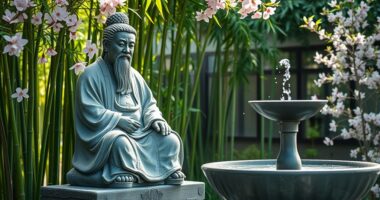Unseen Stoic inspiration behind Marcus Aurelius comes from Antoninus Pius’s humble yet steadfast leadership, grounded in daily virtues and quiet strength. His calm, virtuous actions and humble service quietly shaped Marcus’s mindset and leadership style. By embodying patience, self-control, and integrity, Antoninus demonstrated that true power stems from virtue rather than words. If you continue exploring, you’ll discover how his example still influences authentic leadership today.
Key Takeaways
- Antoninus Pius exemplified humble leadership and virtue through actions, inspiring Marcus Aurelius’s approach to Stoic self-control and integrity.
- Antoninus’s calm demeanor and quiet strength served as a model for Marcus Aurelius’s emphasis on inner resilience and rationality.
- His daily practice of virtue and humility subtly influenced Marcus’s development of authentic leadership and moral character.
- The Stoic principles demonstrated by Antoninus, like patience and service, secretly shaped Marcus’s philosophical outlook and decision-making.
- Unseen by many, Antoninus’s virtuous life provided a foundational moral framework that motivated Marcus Aurelius’s reflective and disciplined mindset.
The Quiet Strength of Antoninus Pius
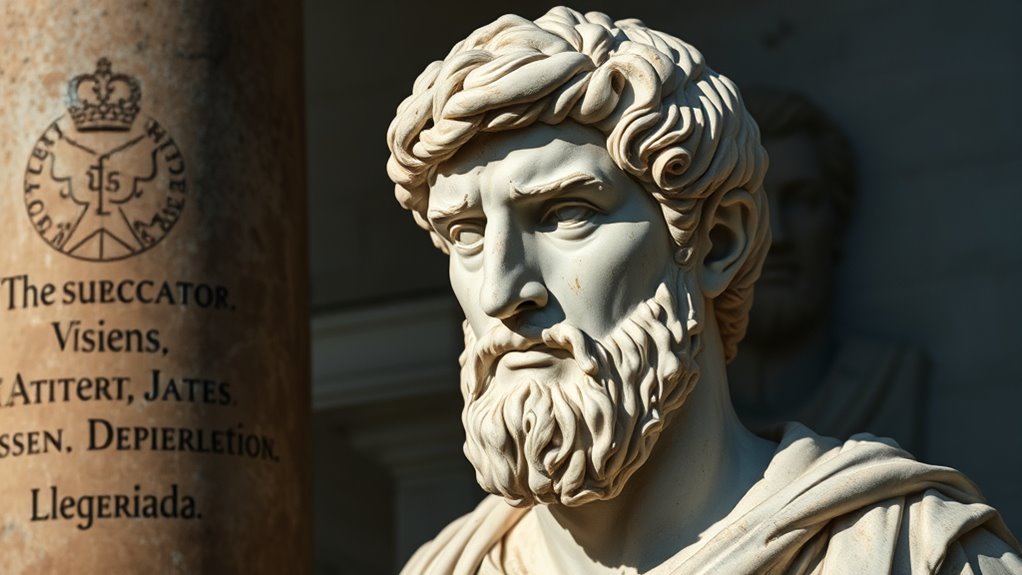
Although Antoninus Pius didn’t see himself as a Stoic or a philosopher, his quiet strength left a lasting mark. His personal humility allowed him to wield imperial authority with restraint and compassion, avoiding arrogance or excess. You’d notice how he led by example—remaining calm under pressure and demonstrating self-control. His demeanor reassured those around him, showing that true strength doesn’t require loud words or displays of power. Instead, he exemplified humility and steady resolve, guiding Rome with a quiet confidence rooted in virtue. Interestingly, his approach to leadership is echoed in modern leadership qualities, where the most effective systems often operate quietly behind the scenes to support learners without overwhelming them. This understated yet powerful approach made him a model of leadership that inspired others to act with integrity and humility, demonstrating how virtue-based leadership can influence a society positively. His example underscores the importance of effective leadership that prioritizes virtue over display, reinforcing the timeless value of modesty in influential roles. Moreover, understanding the personal virtues that guided his actions offers insight into sustainable and ethical leadership practices.
Lessons Learned From a Model of Daily Virtue
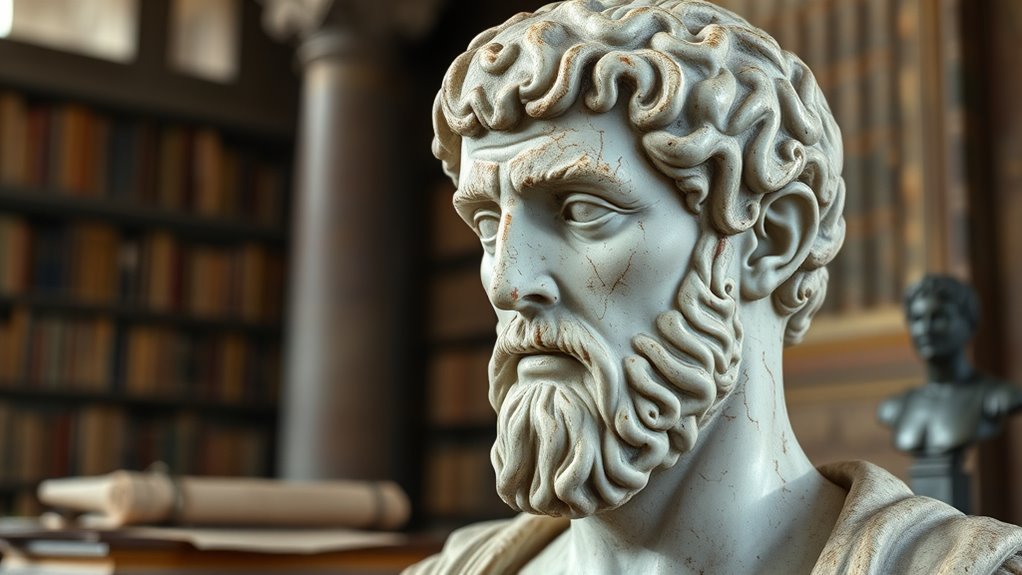
From observing Antoninus Pius, you learn that living daily with virtue requires consistent action rather than just philosophical words. His example shows that embodying ancient virtues like self-control, compassion, and resilience builds personal resilience over time. By practicing these virtues in small, everyday choices, you develop strength and steadiness amid life’s challenges. Antoninus’s life teaches you that true virtue isn’t achieved through theory but through steady, deliberate effort. His silent example demonstrates that resilience and virtue are cultivated daily, shaping a character that endures and inspires. Consistent virtuous action becomes your foundation for genuine personal resilience. Moreover, developing virtue cultivation aligned with virtuous principles ensures that these qualities become an integral part of your daily life. Recognizing the importance of daily routines in virtue development helps reinforce these qualities as part of your character. Establishing positive habits further supports the consistent practice of virtue and resilience in everyday life.
Embodying Stoicism Through Action, Not Words
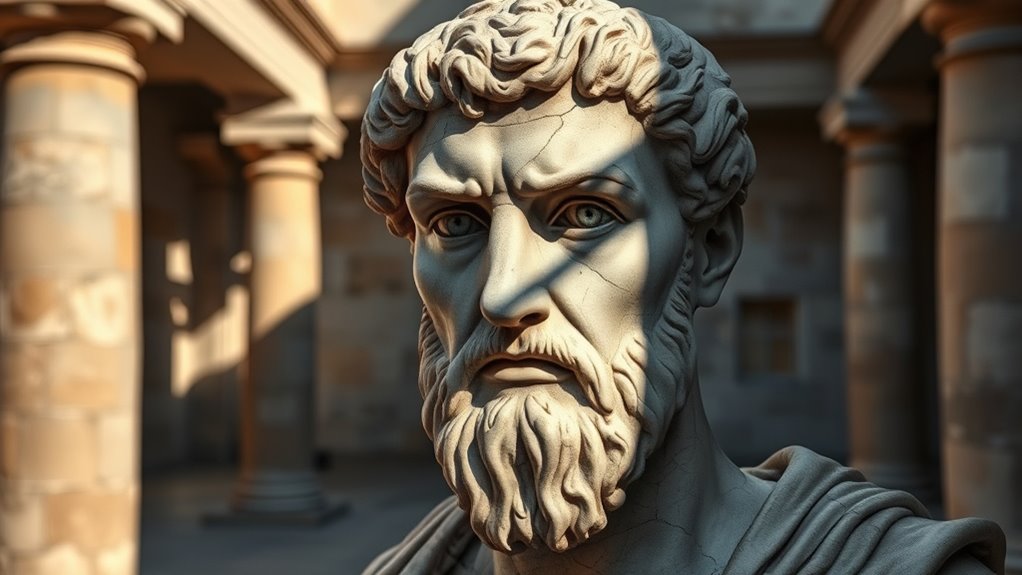
Embodying Stoicism means demonstrating virtues through your actions rather than just talking about them. You show virtue in daily routines by staying calm under pressure, practicing patience, and acting with integrity. Silent leadership speaks louder than words; your consistent behavior inspires others without fanfare. When you handle challenges quietly, you reinforce resilience and self-control. By living these virtues, you become a living example of Stoic principles. Actions reveal your true character, demonstrating that genuine strength lies in what you do, not what you say. This active embodiment of virtue influences those around you, fostering respect and trust through silent, steady leadership. Incorporating positive thinking techniques can further strengthen your ability to embody resilience and maintain a virtuous demeanor in all situations. Recognizing the importance of electric bikes can also serve as a metaphor for sustainable and efficient living, aligning with Stoic ideals of moderation and harmony with nature. Understanding self-discipline as a core element of Stoicism encourages consistent practice and internal mastery in daily life. Additionally, being aware of payment processing security measures can help you develop a disciplined approach to safeguarding your personal integrity and resources.
The Practical Approach to Living Philosophy
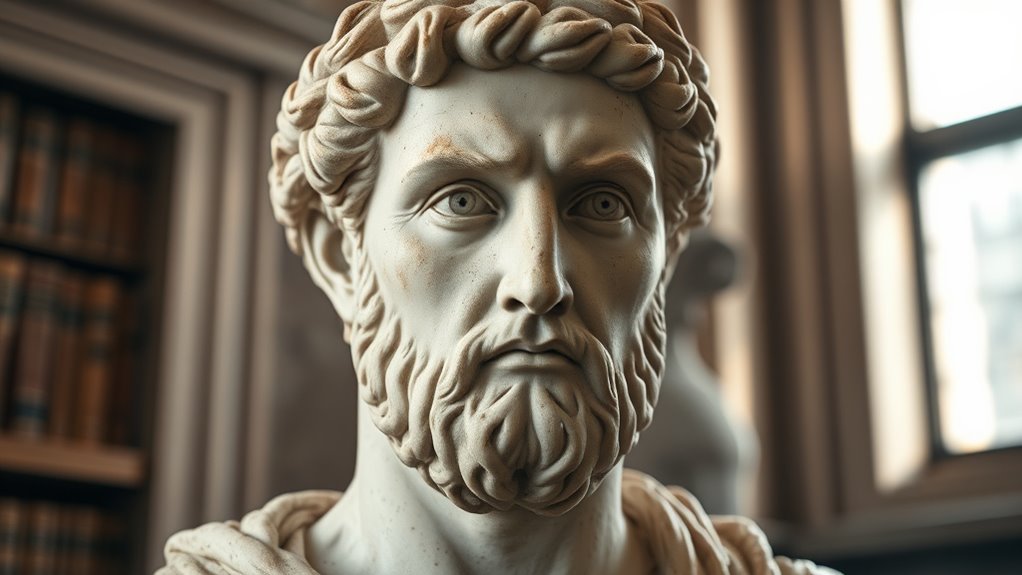
Living philosophy practically means integrating your principles into everyday actions rather than merely contemplating them. You avoid getting caught up in philosophical debates or abstract ethics that stay only in theory. Instead, you focus on simple, consistent behaviors that reflect your values. For example, practicing self-control during stressful moments or showing compassion in daily interactions embodies Stoic virtues. By consciously applying these principles, you develop resilience and authenticity. This approach helps you live your philosophy naturally, making virtue a habit rather than a distant ideal. It’s about acting rightly in the moment, embodying your beliefs through daily choices and genuine effort. Additionally, understanding the importance of vetted practices ensures your actions align with proven methods of living your philosophy effectively. Incorporating preppy dog names as an analogy can also serve as a reminder to choose names and actions that reflect your carefully cultivated values, reinforcing consistency and intentionality in your life. Recognizing potential cybersecurity vulnerabilities in daily routines further supports maintaining integrity and security in your personal and digital life. Exploring impactful quotes can provide continuous motivation and reinforce your commitment to your principles. Being aware of environmental considerations helps ensure your practices are sustainable and respectful of nature.
How Antoninus’ Life Shaped Marcus Aurelius

The life of Antoninus Pius profoundly influenced Marcus Aurelius by providing a tangible example of how virtue can be practiced daily. His ancient leadership combined strength with philosophical humility, showing that true authority rests in service and compassion. Marcus observed Antoninus’s calm demeanor, self-sufficiency, and dedication to duty, which inspired him to lead with integrity. These qualities taught Marcus that genuine leadership isn’t about status but about embodying virtues quietly and consistently. Antoninus’s example reinforced the importance of humility and virtue in governance, shaping Marcus’s approach to ruling with wisdom, patience, and a steadfast commitment to the well-being of others. His vetted leadership qualities demonstrated that true power is rooted in moral character and service to others, illustrating how consistent virtuous behavior cultivates trust and respect. Additionally, Antoninus’s emphasis on ethical conduct set a precedent that Marcus strived to emulate throughout his reign. Moreover, observing Antoninus’s balanced approach to power and compassion helped Marcus develop a stoic mindset, emphasizing endurance and rationality in leadership. This example underscores the significance of moral character as foundational to authentic leadership and personal growth.
Frequently Asked Questions
Did Antoninus Pius Have Any Formal Education in Philosophy?
You might wonder if Antoninus Pius had formal education in philosophy. While ancient educational practices often included philosophical foundations, he didn’t identify as a philosopher or leave writings. Instead, he learned through life experience, observing virtues in daily actions. His natural approach to Stoicism shows that you don’t need formal study to embody core virtues, emphasizing practical wisdom gained through humble, everyday living rather than academic instruction.
How Did Antoninus Pius Handle Personal Adversity?
When facing personal adversity, you see Antoninus Pius handle it with emotional resilience and personal discipline. He stays calm, maintains self-control, and keeps a clear focus on his duties. Instead of reacting impulsively, he accepts challenges quietly and perseveres, demonstrating strength through humility. His composed demeanor shows how practicing patience and self-reliance helps manage hardships, inspiring others to stay resilient and disciplined in difficult times.
What Specific Daily Routines Did Antoninus Follow?
You probably wonder about Antoninus Pius’ daily routines and leadership habits. He maintained a simple, disciplined schedule focused on service, self-control, and compassion. His mornings often started with reflection, prayer, or meditation, setting a calm tone. He prioritized listening to others, making thoughtful decisions, and serving the empire with humility. His routines exemplified steady leadership, emphasizing patience, resilience, and humility — qualities that inspired those around him and exemplify practical Stoicism.
How Did Antoninus Pius Influence Roman Policies and Leadership?
Imagine a steady river shaping the landscape; Antoninus Pius’s leadership did the same for Rome. He influenced policies through calm imperial diplomacy, fostering peace and stability. His judicial reforms improved justice for citizens, reflecting his compassionate and composed nature. You see his impact in how Roman leadership prioritized fairness and negotiation, setting a foundation for a peaceful empire. His example shows that quiet strength and virtue can reshape a nation.
Are There Modern Examples of Similar Silent, Virtuous Leaders?
You can see examples of silent leadership in modern figures who embody quiet virtue. These leaders focus on actions rather than words, inspiring trust through integrity, humility, and resilience. They prioritize service and ethical behavior, demonstrating modern virtue without seeking recognition. Their strength lies in consistency and moral example, showing that true leadership often speaks louder through deeds than through speeches—just like ancient virtuous figures, they prove that silent leadership can shape lasting positive change.
Conclusion
So, next time you face challenges, remember Antoninus’s quiet strength—like an unshakeable mountain standing firm against relentless storms. His simple acts of virtue ripple outward, shaping legends like Marcus Aurelius. You don’t need grand speeches or heroic deeds; just small, consistent acts of integrity can transform your life into an unstoppable force of goodness. Embrace everyday virtue, and watch your life become a towering monument to resilience and grace that leaves the world in awe.




